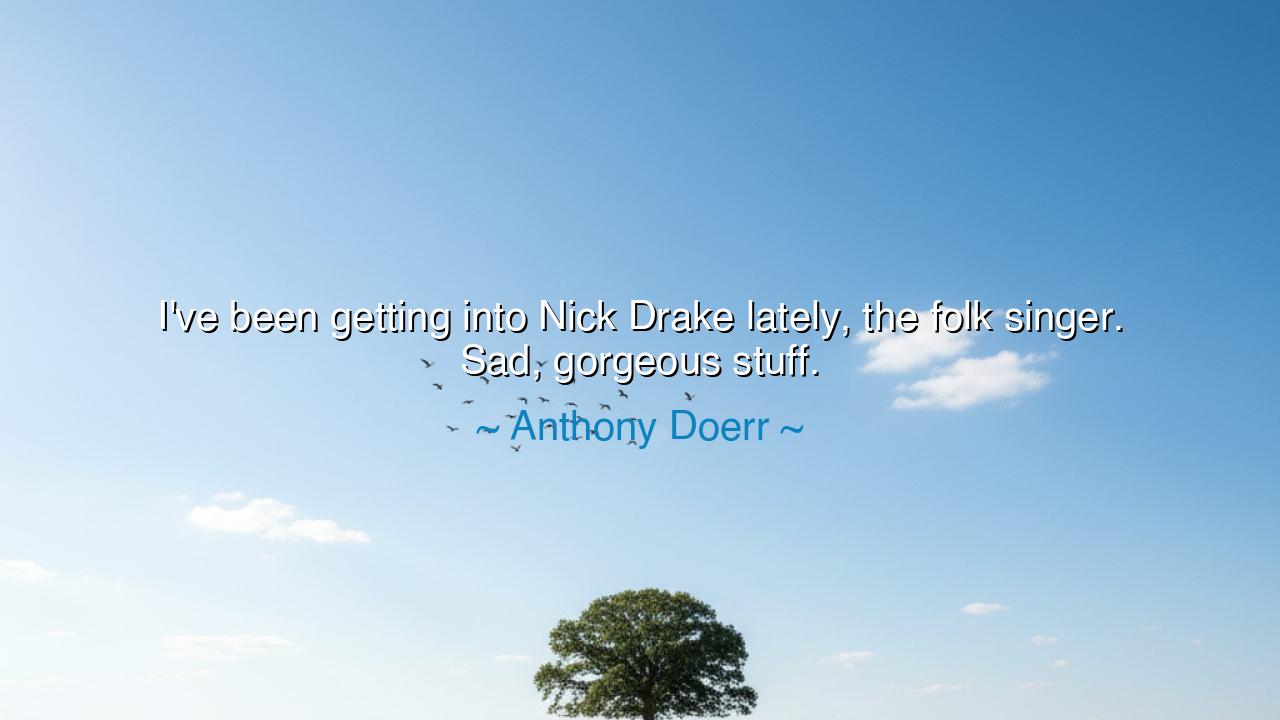
I've been getting into Nick Drake lately, the folk singer. Sad






The words of Anthony Doerr, “I’ve been getting into Nick Drake lately, the folk singer. Sad, gorgeous stuff,” may appear at first to be simple admiration for an artist—but beneath their quiet phrasing lies a reflection on the eternal bond between beauty and sorrow. Doerr, a novelist of deep sensitivity and lyrical wisdom, recognizes in Nick Drake’s music something timeless and spiritual: the paradox that the most moving art is often born from melancholy. His phrase, “sad, gorgeous stuff,” is not casual praise—it is reverence. It acknowledges that true beauty does not always sparkle with joy; sometimes it weeps, and in that weeping reveals the depths of the human soul.
To understand the full weight of Doerr’s words, one must know the story of Nick Drake—the gentle and reclusive English folk singer whose haunting melodies were filled with introspection, longing, and quiet despair. Drake’s voice was soft, almost a whisper, his lyrics filled with yearning for peace and understanding in a world that seemed perpetually distant. He died young, only twenty-six, his music largely unrecognized in his lifetime. Yet his songs, rediscovered decades later, continue to touch hearts across generations. In them, listeners hear not performance, but truth—a naked honesty that transcends time. Doerr’s admiration springs from this recognition: that Drake’s sadness became his beauty, his fragility his form of courage.
In the ancient world, the poets understood this union of sorrow and splendor well. The Greeks called it pathos, the sacred emotion that lifts suffering into art. Homer’s Odyssey was not merely a tale of adventure—it was the story of longing for home, of endurance through loss. The Roman poet Virgil wrote that “tears of things” dwell in all human hearts; to see beauty clearly is to feel the ache of impermanence. In calling Drake’s music “sad, gorgeous stuff,” Doerr speaks as those ancient poets once did—he recognizes that beauty’s truest form is not perfection, but the tender imperfection of human feeling.
There is something profoundly heroic in the quiet sadness of Drake’s songs. In an age obsessed with noise and spectacle, his music stands as an act of resistance—a whisper in the storm. It teaches that one need not shout to be heard, nor dazzle to move others. His art reminds us that gentleness, when sincere, carries its own strength. Like the brushstrokes of Van Gogh, whose sorrow painted stars into the night sky, or the fragile words of Emily Dickinson, who turned isolation into revelation, Drake’s voice transforms vulnerability into immortal resonance. His sadness is not despair, but illumination—the soul’s attempt to make sense of existence through melody.
Doerr’s appreciation, then, is not merely for the music itself, but for what it represents: the healing power of beauty found within suffering. When he says “sad, gorgeous stuff,” he is describing a truth that every sensitive soul must one day learn—that to feel deeply, even painfully, is a privilege. The heart that can ache can also love. The eyes that weep can also see clearly. Beauty that comes from sorrow has a weight, a gravity, that joy alone cannot carry. It reminds us that to be human is to dwell within both light and shadow, and that meaning is born from the tension between the two.
There is a lesson here for all who walk the road of creation or contemplation: do not flee from sadness—listen to it. For sorrow, when embraced, becomes wisdom. The artist who dares to express his pain teaches others how to bear their own. The listener who allows himself to feel is not weakened, but awakened. Just as the night sky reveals its stars only in darkness, so too does the heart discover its beauty in the quiet hours of grief. Doerr’s admiration of Nick Drake is therefore a meditation on this sacred truth: that art which mourns also redeems, that sadness is not the enemy of joy, but its companion.
So let this teaching be passed down: seek the beauty that dwells within sadness, and let it teach you to cherish the fragile miracle of life. Do not fear the melancholy that visits the heart—it is the sign of a spirit still alive, still capable of wonder. As Anthony Doerr reminds us through his gentle words, the “sad, gorgeous stuff” of existence—music, memory, loss, and love—is what makes life luminous. To feel deeply is to live deeply. And to find beauty in sorrow is to touch, for a moment, the eternal harmony of the soul.






AAdministratorAdministrator
Welcome, honored guests. Please leave a comment, we will respond soon